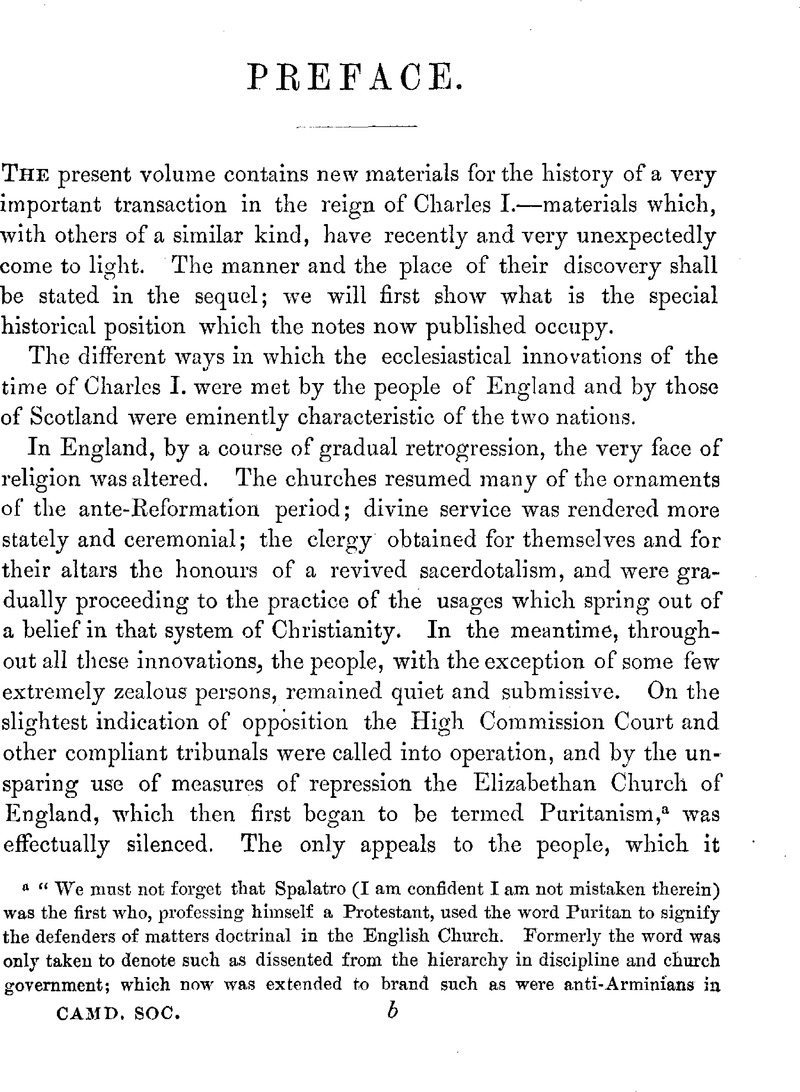No CrossRef data available.
Article contents
Preface
Published online by Cambridge University Press: 24 December 2009
Abstract

- Type
- Preface
- Information
- Copyright
- Copyright © Royal Historical Society 1869
References
page i note a “We must not forget that Spalatro (I am confident I am not mistaken therein) was the first who, professing himself a Protestant, used the word Puritan to signify the defenders of matters doctrinal in the English Church. Formerly the word was only taken to denote such as dissented from the hierarchy in discipline and church government; which now wa-s extended to brand such as were anti-Arminians in their judgments. As Spalatro first abused the word in this sense, so we could wish he had carried it away with him in his return to Home. Whereas now, leaving the word behind him in this extensive signification thereof, it hath since by others been improved to asperse the most orthodox in doctrine and religious in conversation.”—Fuller's Church Hist, book x. sec. 19.
page v note a Hist. Rebell. p. 53, ed. 1843.
page v note b Hist. Long Parl. p. 3, ed. 1813.
page vi note a Lord Hailes's Mem. of Charles I. p. 81. Clarendon's State Papers, ii. p. 99.
page vi note b Memorials, p. 35, ed. 1732.
page vi note c Hailes's Mem. p. 91.
page vi note d Ibid.
page viii note a Calendar of Domestic State Papers, 1637–8, pp. 584, 601.
page xvii note a See Rushworth, ii. part 2, p. 1210.
page xxvii note a Dom. State Papers, tinder date.
page xxviii note a Clarendon State Papers, ii. 91.
page xxviii note b Ibid.
page xxix note a We have printed the Declaration in the Appendix, with Archbishop Laud's Notes upon it; also the Information. Both are from copies among the State Papers.
page xxix note b Clarendon's State Papers, ii. 112.
page xxx note a Letter of Henry Percy, Dom. State Papers, 31 Aug. 1640, printed in the Appendix.
page xxx note b Clarendon State Papers, ii. 94.
page xxxi note a Clarendon State Papers, ii. 95.
page xxxi note b Ibid. ii. 117.
page xxxii note a Hardwicke's State Papers, ii. 170.
page xxxiv note a We have printed Windebank's Notes of this interview in the Appendix.
page xxxiv note b Secretary Vane to Secretary Windebank, 16 Sept. 1640, Dom. State Papers.
page xxxv note a Notes of Council, 16th Sept. 1610, Dom. State Papers.
page xxxv note b Secretary Vane to Secretary Windebank, Dom. State Papers, under date.
page xxxvii note a Every historical writer who has used these notes has been emphatic in their commendation as exhibiting the ability of the King and his skilfulness in debate. They were published by Lord Hardwicke (State Papers, ii. 130). It is not stated that they were written by Sir John Borough, but he was Secretary at that time to the Earl Marshal, in whose tent the meeting was held, and by whom the notes were sent to Archbishop Laud.
page xxxvii note b Hardwicke's State Papers, ii. 208–298.
page xxxix note a There is a view of it in Collinson's History of Somersetshire, vol. iii. p. 516.




